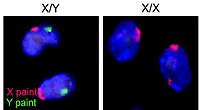
Photo from wikipedia
Objective The risk of recurrence after atrial fibrillation (AF) catheter ablation (AFCA) is higher in women than in men. However, it is unknown whether a sex difference exists in antiarrhythmic… Click to show full abstract
Objective The risk of recurrence after atrial fibrillation (AF) catheter ablation (AFCA) is higher in women than in men. However, it is unknown whether a sex difference exists in antiarrhythmic drug (AAD) responsiveness among patients with recurrence. Methods Among 2999 consecutive patients (26.5% women, 58.3±10.9 years old, 68.1% paroxysmal AF) who underwent de novo AFCA, we compared and evaluated the sex differences in rhythm outcome in 1094 patients with recurrence and in 788 patients who subsequently underwent rhythm control with AAD. Results During a follow-up of 48.2±34.9 months, 1094 patients (36.5%) had AF recurrence after AFCA, and 508 of 788 patients (64.5%) had AF recurrence under AAD. Although the rhythm outcome of a de novo AFCA was worse (log-rank p=0.041, HR 1.28, 95% CI 1.02 to 1.59), p=0.031) in women, AAD response after postprocedural recurrences was better in women than in men (log-rank p=0.003, HR 0.75, 95% CI 0.59 to 0.95, p=0.022), especially in women older than 60 years old (log-rank p=0.003). In 249 patients who underwent repeat procedure after AAD use, the pulmonary vein (PV) reconnection rate (62.7% vs 76.8%, p=0.048) was lower in women than in men but not the existence of extra-PV trigger (37.8% vs 25.4%, p=0.169). Conclusions Although women showed worse rhythm outcomes than men after AFCA, the post-AFCA AAD response was better in elderly women than in men. Trial registration number NCT02138695.
Journal Title: Heart
Year Published: 2022
Link to full text (if available)
Share on Social Media: Sign Up to like & get
recommendations!